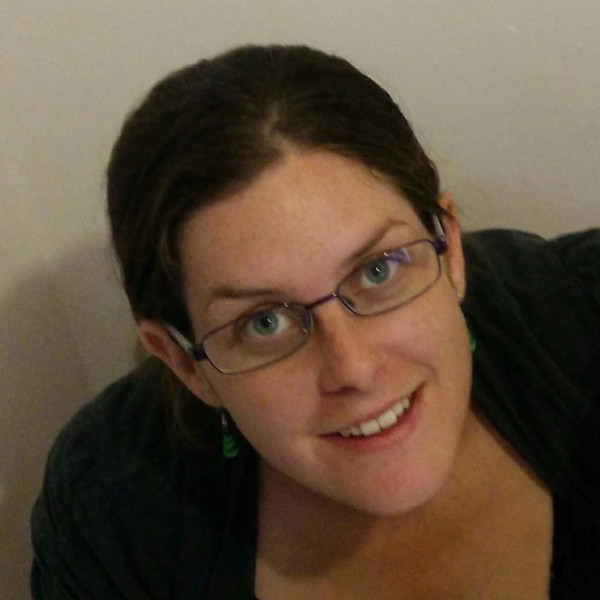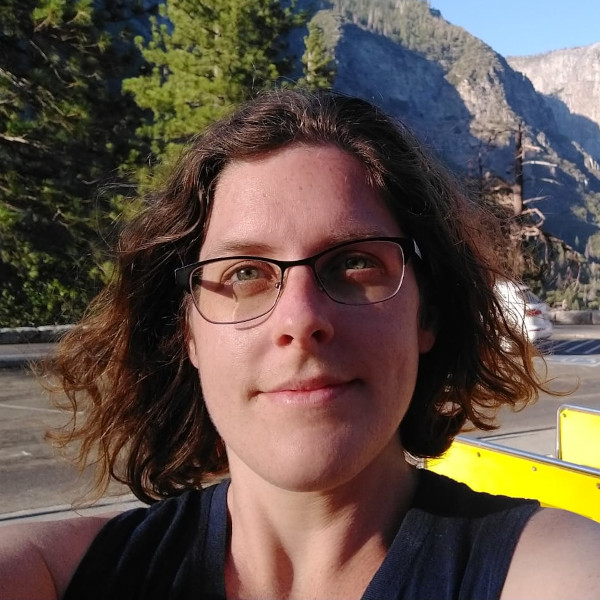Interviews with Olim
Each month, we interview an oleh or olah for our newsletter.
We invite you to read the stories of LGBTQ+ people who have made Israel their home.
"I moved here to get a fresh start"
Interview date: June 2016.
Update: August 2022. Scroll down for update.
Q. Where were you born and where did you grow up?
A. I was born in San Francisco, CA. I grew up in the bay area through middle school and then moved to Chicago, then a tiny town in New Jersey and then finished high school in Virginia, just outside of Washington DC.
Q. At what age did you come out? And how did it go?
A. I was never trying to hide anything or live in the closet. I guess I was discrete for a few months when I started dating my first girlfriend at 16. When my parents found out, they were very upset and annoyed. They expressed concern that anybody in the LGBTQ community is unlikely to be successful because they live on “the fringe of society”. My mother was supportive ultimately but my father never was.
Q. Were you involved at all in the LGBT community back home?
A. In California I was part of the Gay Straight Alliance. In high school in Virginia I participated in SMYAL events (Supporting and Mentoring Youth Advocates and Leaders), Alternative Prom and Youth Pride DC.
Q. What is your involvement (if any) in the LGBT community in Israel?
A. In Israel I found it really hard to find any community. I met many people from the community as lone individuals. When I came to Israel, I was moved to the North and the Haifa area, there are very few events or places that are openly gay friendly. Syncopa Bar has gay nights and drag shows very occasionally and once a month Luna (a dance club) had a gay friendly night. Once I moved to Jerusalem, I met people at the Mikveh and Women’s Gatherings.
Q. How long since you made Aliyah?
A. I moved to Israel around 10 years ago, in Feb 2007, after being here a few months as a prolonged tourist.
Q. Did you move here on own or with family/friends/significant other?
A. I moved here by myself without any family, friend or organization.
Q. Why did you make Aliyah?
A. I moved here to get a fresh start, without my family. I wanted to live a life that wasn’t overshadowed by my parents’ divorce.
Q. How is it going so far?
A. It took many years to be happy with my life here in Israel. Things are progressively getting better and better as I integrate into this new culture.
Q. How is your Ivrit?
A. My Hebrew is very natural to me, almost as much as my English. I use Hebrew to express myself the same way I would in English.
Q. What has been your biggest challenge so far?
A. Overcoming the challenge of networking was difficult. Figuring out how to navigate the job market and the country’s laws and bureaucracy was very hard for me.
Q. How do you perceive the Israeli LGBT community?
A. I think that the Israeli LGBTQ community is very marginalized and quiet. It seems like people don’t feel confident they will be accepted in the social circles they grew up in. Many people here choose not to go to gay-friendly events if they aren’t looking to hook up with someone.
Q. How is being gay in Israel different to back home?
A. Being bi back home was not a big deal. I was never criticized for it. I never felt picked on. I had a lot of very supportive friends. It was a normal part of life. Here it seems to be less acceptable to start a non-traditional family. Many of my friends don’t believe they are looking for a life partner and just settle for one night stands or short relationships. They anticipate issues of stability within their relationship. This was not a view I was exposed to back home (though I was a minor – so I never went to bars or anything).
Q. If you were making aliyah now, would you do anything differently?
A. I would seek out help from others more and stop worrying that I need to tough it out alone in order to be considered a proper Israeli.
Shani

Our Newsletter
Sign up if you would like to receive a monthly email listing events of interest to LGBT English-speakers in Israel, an interview with an oleh/olah and other useful information.
Want to be interviewed?
Complete the form below and we will get back to you.
"I feel most at home surrounded by my people"
Interview date: August 2022
Q. Has your life changed since we last interviewed you? If so, how?
A. Well, Covid has changed everyone’s reality over the last few years. Despite working from home for many years now, sometimes I felt trapped or frustrated with very little routine and personal space during the lockdowns. But honestly, I am really lucky to have found my wonderful and supportive partner, Cecilia Yardena. We have been living together for the last two years. She’s a wonderful lady who also runs some events for our glorious, colorful, LGBTQIA community. Our community has always been a part of my life, growing up with many friends and family out of the closet, proud, just being themselves. I feel most at home surrounded by my people.
Q. Are you still living in the same city to which you made aliyah? Or have you moved around?
A. I have moved around, mostly in Haifa area and then Jerusalem for university, but I am so happy to be back living in Haifa again since 2016. Haifa is really the city for me. It is diverse, interesting, in some ways similar to the San Francisco Bay Area in California where I grew up. There are more small communities here – open, growing and supportive in a way that didn’t exist for me in other places. People here are more forthcoming, more helpful, not fake, but a genuine earnest type of interaction, a dynamic built on neighborly vibes and a desire to make the spaces around us better, safer and more interesting for ourselves and our families.
Q. Are you working in your desired industry/area? Do you have any advice on job hunting, job applications and interviews?
A. My BA was in Linguistics. I guess that doesn’t exactly have a clearcut profession. I have often worked in translation or editing. When I was 12, I dreamed of studying sociolinguistics and simultaneous translation. This year I finished my professional training as a sign language interpreter. During my program studies, my daughter finished the first grade which was certainly challenging, also as a queer couple raising a kid in a conservative neighborhood. So I am navigating a new element in my career going from translations on the computer to interpreting live conversations. It has some challenges and I love it. Now I am switching from working for a company in a steady job for over 6 years to becoming a freelance interpreter. Freelancers have to spread the word about their services and specialties. I’m looking forward to working more closely with the Deaf and Hard of hearing community.
In the last 15 years I must have told thousands of people about job hunting in Israel. My advice is mostly simple: learn more about yourself and what you are good at (you might surprise yourself) and connect with people. Job searching here in many ways is less about merit and more about connecting with people who work in the industry you want to work in. Ask people what they do for money, how they found that job, what the company is called. Don’t be afraid to ask for someone to recommend you, or for them to tell you about their work conditions and salary. Don’t assume that a good degree is going to get you a job. Often friends, family and acquaintances are the key to finding a place to work. Don’t ignore a job opportunity just because you aren’t sure of your credentials or your Hebrew skills. Many places are flexible about that. Take a chance! Don’t be afraid to try. Israel is a country that believes less in rules, laws and credits and more in people.
Q. How is your Ivrit now? What sites or apps would you recommend that helped you?
A. I would strongly recommend Drops, Mondly, Memrise, and tandem group meetings like Fluent Language Exchange in Tel Aviv or online. Duolingo now also allows you to set up in-person events which I found were very successful. I watched some Hebrew-language shows with the subtitles and then switched to Hebrew subtitles and repeated it for vocab, eventually turning the subtitles off. I improved a lot like that.
Q. Have you discovered any off-the-beaten-track locations that you’d recommend to others?
A. My favorite place in Israel is Rosh Hanikra in the north. The waves in the caves are magical. I also loved hiking Shvil Israel, the national trail that runs all through Israel. I also really like all those easy nature hikes along Israel’s streams that usually end in a small pool or natural spring, like Nahal haShofet.
Q. Are there any other groups or activities that you found that helped you integrate more into Israeli society?
A. I found that working in a job that was not exclusively with English-speakers helped a lot with my integration. Volunteering at different community centers and joining social groups, finding fun things to do with others, that put me in contact with many people on a monthly basis. I also liked taking short 4-8-week classes in a language or learning a skill like sewing or gardening or painting. I found that I made friends I was happy to spend time with during such classes. We all have to build ourselves a little community, a little chosen family, to enjoy life with, to support us, celebrate with us, people we can love who make it all worth it in the end.
Q. Do you feel that living in Israel has changed you? If so, how?
A. Living in Israel has definitely changed me, for the better. In Israel I grew into a woman from an adolescent. In Israel I learned more about my skills and my limitations, I learned more kindness for myself and others. I opened up while also learning boundaries. I learned to respect my ‘mistakes’ as unexpected opportunities I can learn from and I appreciate the experience gained. I learned to be more self-directed, independent, vocal about my opinions, assertive and persistent. I have always been curious and diligent but now I feel I can accomplish more of the things I find meaningful in life.
Q. Do you have any practical advice for new olim/olot or anyone who’s considering making aliyah?
I would advise against trying to recreate a version of your old life and home country here in Israel. I would hope that as you make this big change in your life you realize it is going to be challenging. You will need other people along the way. Moving to another country, immigrating, it changes people. It can be tough. It can also be very rewarding. Be open to trying new things and getting to know yourself. Everyone in Israel has an opinion and wants to give you advice. That can be overwhelming for a passive person, an introvert or a young soul. Sometimes it’s worthwhile to think if this person’s life and behavior are your goal. Are their successes where you want to end up? And consider whether or not their advice is right for you.
Shani

Our Newsletter
Sign up if you would like to receive a monthly email listing events of interest to LGBT English-speakers in Israel, an interview with an oleh/olah and other useful information.
Want to be interviewed?
Complete the form below and we will get back to you.


